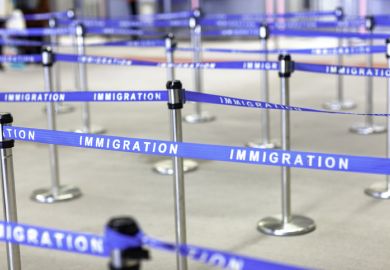After the single currency, try the single tongue" - thus reads the headline for a recent piece in The Times by Alan Hamilton quoting an Italian MEP bent on promoting a more cohesive Europe through a common language. Conscious no doubt of his own future employability, the distinguished member could not quite bring himself to say which language. But with 42 per cent of the citizens of Europe already claiming the ability to use English, there are no prizes for guessing.
Roll on then the idea (ideal?) of a global language with English in the pole position? The notion of a lingua franca for the entire world hardly surfaced before the 1950s. Since then the phenomenon of an incredibly shrinking planet - travel, communications, business - has brought the reality closer. It can be a brutal reality. In Vietnam, chosen host of the next Francophone summit, vast French investment in airport and conference centre does nothing to slow the remorseless march of English through the education system. In Syria, close political relations with France and the undoubted life-enhancing qualities of French culture have not prevented the emergence of English as the first foreign language.
David Crystal asks, and more concisely than most, what a global language is, why it should be English and what of the future. A global language is, well, one that "develops a special role that is recognised in every country". Fair enough, but what counts as "special"? The short first chapter explains: mother tongue, official language, second language, most widely taught. So English speakers, relax: English is streets ahead and fast drawing away from the rest of the chasing pack. Actually, Crystal does not want us to relax and urges against triumphalism. He warns of the resentment, envy, anger of the non-English mother-tongue speakers who feel disadvantaged. Or who, worse still, feel their mother tongue or identity threatened. He offers our Italian MEP cold comfort, since a common tongue does not even guarantee social harmony - witness Vietnam, the Spanish civil war, Northern Ireland et al. And with exquisite courtesy he eschews the title "English as the global language", which English indisputably is, on the grounds that the claim is itself a political statement. But presumably at some stage it has to be accepted as a statement of fact, regardless of whether it represents a desirable or an desirable state of affairs.
The second chapter is a masterly synopsis of the spread of English across the world - no need to search the remaindered stacks for longer tomes. The British empire began the process in the 19th century. When a quarter of the globe was painted pink, who was going to stand in the way of the language of the conquerors? The United States continued the spread in the 20th century. On it still strides: we can argue about what globalisation is till the cows come home - but that globalisation exists is beyond question, with English its accompanist. The accompanist is, of course, indispensable to the performance.
Crystal deals briskly with arguments about the supposed internal strengths of English. The usual suspects - flexibility, clarity, logicality, ease of learning, receptivity - are considered in turn and found wanting. None is unique to English. Children learn their own mother tongues at the same speed regardless of the tongue. The secret of the success of any language, when all is said and done, is muscle: Latin marched with the Roman legions, Arabic with the Muslim armies, Spanish crossed the Atlantic with the conquistadors. English was no different. British force of arms simply took it further across the face of the planet than any other military power of any other linguistic persuasion before or since. Economic muscle, the power of the anglophone dollar, was the successor. Bill Gates is reaching the parts others have not reached.
But that is not quite the end of the story and Crystal has two important chapters on the "worth" of English, in the sense of the value that people worldwide have placed on English as evidenced in the ways they use it. Behind British imperial expansion stood the industrial revolution, and English as a consequence brought access to the culture of those historic changes. Access to power and access to money. The 20th century has seen a similar tale, with English again as the gatekeeper to the new sunlit uplands containing our latest icons and cynosures: the broadcasters and advertisers, the acronyms of regional and global authorities (Asean, Nato, Opec, Seato), education, the movie business and the pop industries. So what could bring the merry dance to a halt? Nothing short of cataclysm, says Crystal: English has taken. It belongs to the users now, not its first sponsors. Salman Rushdie agrees. In a recent essay in the New Yorker he points to all the work, fiction and nonfiction, produced by Indian writers writing in English since 1947. English has become naturalised. It is now "Indo-Anglian" and an Indian language, a language of Indian self-expression, even of identity, used by the young with no sense of alien intrusion or political unacceptability. (But see Radhakrishnan Nayar's review, THES, June )
That, come to think of it, is a bit of a relief. For some people, for instance those in Cornwall, Wales, Scotland and Ireland, ask of English: can it act like an assassin? And not just of English: ask the Basques and Catalans about Spanish. Nor is it just the fate of the language of relatively small communities. Would French survive in Quebec without a scaffolding of protective regulation to shore it up? Before passions run too high, it is worth reflecting that to apply the language of anthropomorphism to English or any other language (will it "drive out" ...?) has its dangers. Behind it is the reality of countless millions of acts of choice, by students, teachers, employers and the employed who have no interest in the health, future, spread or whatever of the English language. What "drives" them is a view of their job prospects, their relationship with the rest of the world, their excitement in youth culture, a wish to be insiders, to be in touch. An ecological approach to language diversity has limitations as well as obvious attractions.
Crystal writes as an advocate of both multilingualism and the value of English - what he calls world standard spoken English (WSSE) - as "an amazing world resource which presents us with unprecedented possibilities for mutual understanding". He sees no evidence for its inevitable decline into fragmented mutual unintelligibility. His ideal is a world in which each person speaks two or three languages: his or her mother tongue, the source of one's original cultural identity and references; the local "naturalised" form of English - "new Englishes" - in familiar (and some unfamiliar) variants such as Caribbean English and Australian English, which now derive strength from their differentiation; and WSSE, which variant English speakers would break into naturally at international conferences, in multinational companies and the like.
Only time will tell. But the resilience of Lithuanian, Latvian and Estonian, which survived the deliberate strangulation of Russian language policy imposed by the former USSR, provides at least some support for the robustness of non-English first tongues under the severest of pressure. And the behaviour of Arabic in the modern world, which exists in many spoken dialect forms from the Persian (Arabian?) Gulf to the Atlantic but thrives also in a standard, modern literary form comprehensible to all Arabs with basic education, provides an obvious parallel for WSSE.
English as a global language arrives as an elegant successor to Robert McCrum's The Story of English, published in 1986. It is at the same time cool and immensely authoritative. Less than half the size, but with scarcely less text than its richly illustrated Rolls-Royce predecessor, it sets a new standard in the popularisation of linguistics.
Sir John Hanson is director-general, British Council.
English as a Global Language
Author - David Crystal
ISBN - 0 521 59247 X
Publisher - Cambridge University Press
Price - £12.95
Pages - 150



